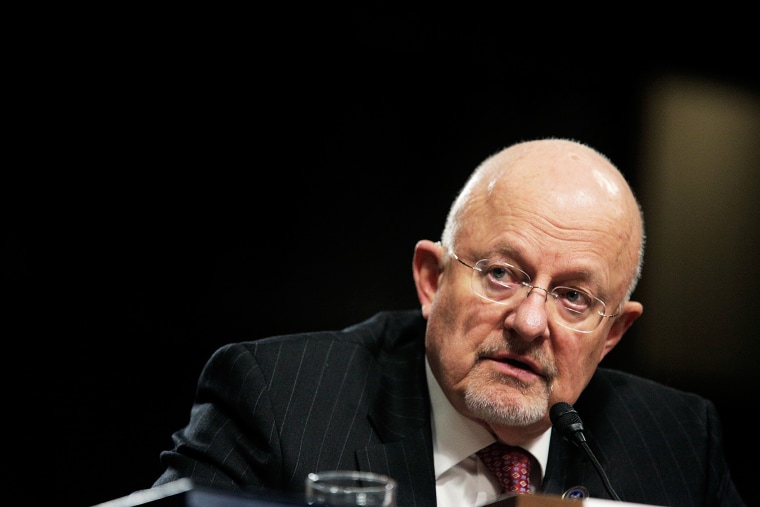It's a problem when the director of National Intelligence can't seem to get his story straight.
Speaking Thursday at the Intelligence and National Security Summit in Washington, D.C., James Clapper said that the intelligence community has not willfully violated the law, an assertion which documents and information from former NSA contractor Edward Snowden contradict. And when CIA Director John Brennan took the stage for a panel on Thursday afternoon, he blamed media "mischaracterizations" for catching him in a lie over spying on Congress.
When Clapper laid out seven principles of professional ethics for the intelligence community, he said integrity became particularly important to him, “when I got accused of lying to congress because of a mistake … I had to answer on the spot about a specific classified program in a general, unsecure setting.”
But last year, in an interview with NBC News’ Andrea Mitchell, Clapper took a different approach to his tense March 2013 exchange with Oregon Sen. Ron Wyden. When Wyden, a Democrat, asked if the NSA gathers “any type of data at all on millions of Americans,” Clapper responded “No,” and “not wittingly.” After a Guardian report contradicted that statement, Clapper said he gave the “least untruthful” response to a complicated question.
Wyden’s office confirmed that not only had Clapper received Wyden’s questions in advance, but that he had been offered the chance to amend his answer after the public hearing, but did not do so. Wyden has been a leader in legislative efforts to reign in NSA spying.
The seven ethical principles listed by Clapper, which were originally published two years ago, are: 1) mission; 2) truth; 3) lawfulness; 4) integrity; 5) stewardship; 6) excellence; and 7) diversity.
The CIA, another intelligence agency that falls under Clapper's authority, has been locked in conflict with the Senate Intelligence Committee over redactions to its report on the agency's use of torture during the Bush administration. That report has yet to be released to the public.
According to Brennan's version of events, the computers weren't technically "hacked into," and it wasn't done specifically "to thwart the investigation" into CIA torture, and he established accountability board, so the media should back off. In July, he apologized for "improperly" accessing computers used by Senate staffers. But he said in March, "As far as the allegations of, you know, CIA hacking into, you know, Senate computers, nothing could be further from the truth. I mean, we wouldn't do that. I mean, that's -- that's just beyond the -- you know, the scope of reason in terms of what we would do."
Clapper also unveiled the 2014 National Intelligence Strategy, which lays out the objectives and priorities for the U.S. intelligence community. Those priorities, Clapper said, are harder to achieve now thanks to a “perfect storm” of challenges brought on by the Snowden leaks. "The result of that perfect storm is that we-as a nation-are taking more risk," he said.
Calls for greater transparency, accountability and the protection of civil liberties amount to demands for an “immaculate collection,” Clapper said to laughter. Budget cuts, decisions to stop collecting intelligence on specific targets and damaged relationships have all made it harder for the U.S. to safeguard against possible threats.
